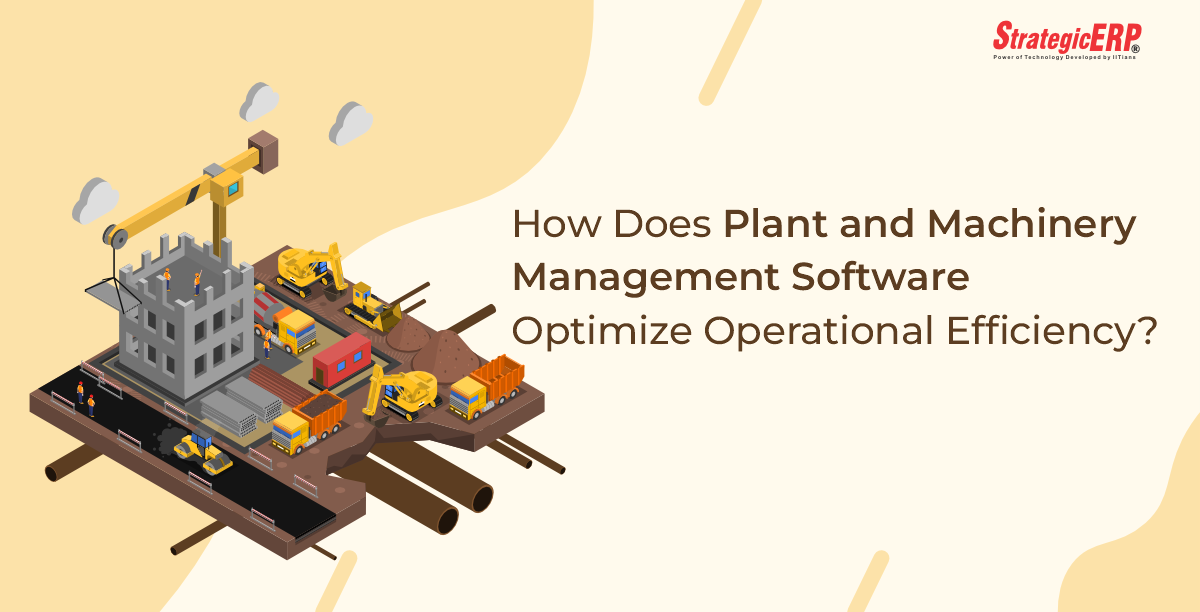How Does Plant and Machinery Management Software Optimize Operational Efficiency?
Category : ERP
Blog posted by : Admin / 27 Sep, 2023
Plant and machinery add value to a business by playing a crucial role in increasing revenue. Sudden or frequent breakdowns not only lead to a decline in productivity but add unnecessary costs. To ensure that a company’s fixed assets are available round the clock and functioning at optimal levels, it is advisable to invest in plant and machinery management software.
What is Plant and Machinery Management?
Infrastructure, construction, and real estate businesses rely heavily on equipment to get their work done. Their plant and machinery can be long-term physical assets or can be rented for shorter durations.
In either case, such capital-intensive industries need to maintain them to receive a good ROI. By managing equipment, scheduling maintenance checks and tasks, monitoring fuel and production, streamlining procurement and billing helps prolong its functional life and prevents breakdowns.
Why is Plant and Machinery Maintenance Software Important?
By streamlining preventive maintenance tasks, managing various equipment, monitoring production, and procuring new machinery, the plant and machinery management software provides many benefits:
- Lowers the cost of ownership
- Decreases operating costs
- Increases productivity
- Helps generate more revenue
- Reduces downtime
Whether an organization owns fixed assets or rents equipment, a cloud-based equipment management system enables the workforce to easily manage their plant and machinery on a single centralized system that can be accessed by them at any time from any location.
Features of Plant and Machinery Management Software
A centralized system to manage, monitor and maintain equipment is an important investment for construction and infrastructure companies as well as real estate businesses. To ensure the safety of their workforce while providing them with high-functioning tools, companies implement plant and machinery management ERP software.
There are many ways it can optimize operations and equipment health. Whether users are accessing it through their laptops or mobile phones, the insights provided by a plant management system helps them stay informed on-the-go.
To truly understand the depth of plant and machinery management, it is vital to understand its features and the processes it streamlines.
To optimize fuel consumption, the cloud ERP software helps monitor standard consumptions, fuel tank capacity, ideal working hours or UOM and daily fuel consumptions for every machine. Daily log books can also be maintained on the system.
Not only plant and machinery but its parts too can be integrated with the ERP system. For instance, companies can manage and maintain the details of tires and batteries for registered assets. The location of the machines or parts can be recorded and updated. Their usage can be monitored and set limitations on the Unit of Measurement (UoM) readings as needed.
It also helps with route planning, vehicle tracking, and managing transportation-related data and bills. The transportation of goods worth more than ₹50000 would require an e-Way. Through the plant management system, you can easily generate e-way bills.
Companies can also establish a preventive maintenance plan by specifying tasks and their priority, frequency, due date, and reminder date. The equipment management software also helps to proactively plan for breakdown maintenance, allowing for the direct creation of tasks outlining the necessary actions.
Through the plant and machinery management system, users have the capability to generate a maintenance schedule for preventive maintenance, whether it is time-based or measurement-based. The system also triggers alerts based on both, the remainder date and the due date to ensure timely maintenance activities.
For the procurement of plant and machinery or its parts, users can generate requisition through the system, including machinery and material service requests too. Probably one of the most important raw materials for construction and infrastructure companies, the ready-mix concrete, its procurement can be managed too with the RMC dispatch note.
Job card creation can be easily accomplished on the plant maintenance software, for different types of maintenance schedule, including preventive, scheduled and breakdown. Information about the equipment, breakdown, priority, problem definition, reasons and suggestions can be stored on the system.
From maintaining a list of raw materials and the tasks required for production, creating schedules, assigning resources, to monitoring the daily production rate, a cloud-based plant and machinery management software optimizes production processes.
Managing multiple site operations is not an easy task, while keeping track of the equipment. The machinery management software can be used for various types of construction site equipment such as crusher plant, weighbridge, excavators and more. Whether an organization decides to own an equipment or rent it, it can be managed easily in the system.
Data analytics and reports are essential for the effective management and smooth functioning of equipment. The plant and machinery management ERP empowers organizations with invaluable data through its daily production, logbook, machinery movement, asset details and demobilization forecasting reports to make well-informed decisions.
Lastly, in order to create a truly one-window centralized equipment management system, integrating IoT (Internet of Things) devices is crucial. IoT integration allows real-time data collection, enabling predictive maintenance, performance monitoring, and resource optimization.
Many industries such as infrastructure, construction, real estate, power and energy, oil and gas operate in a highly competitive environment. Plant and machinery become the lifeline of these industries as they enhance their production and operational capabilities.
The plant and machinery management ERP software is a comprehensive system that not only manages the fixed assets of a company but also enhances communication among its stakeholders. In order to gain a competitive edge, adapt to changing demands, and scale with time, the cloud ERP becomes indispensable.
This proactive technology-integration approach not only reduces downtime and maintenance costs for construction dependent industries but also enhances overall operational efficiency. Through the plant and machinery management system, managers gain invaluable insights into the health and usage of their assets, enabling data-driven decision-making and ensuring that it operates at peak performance levels, ultimately leading to increased productivity and competitiveness in the industry.








